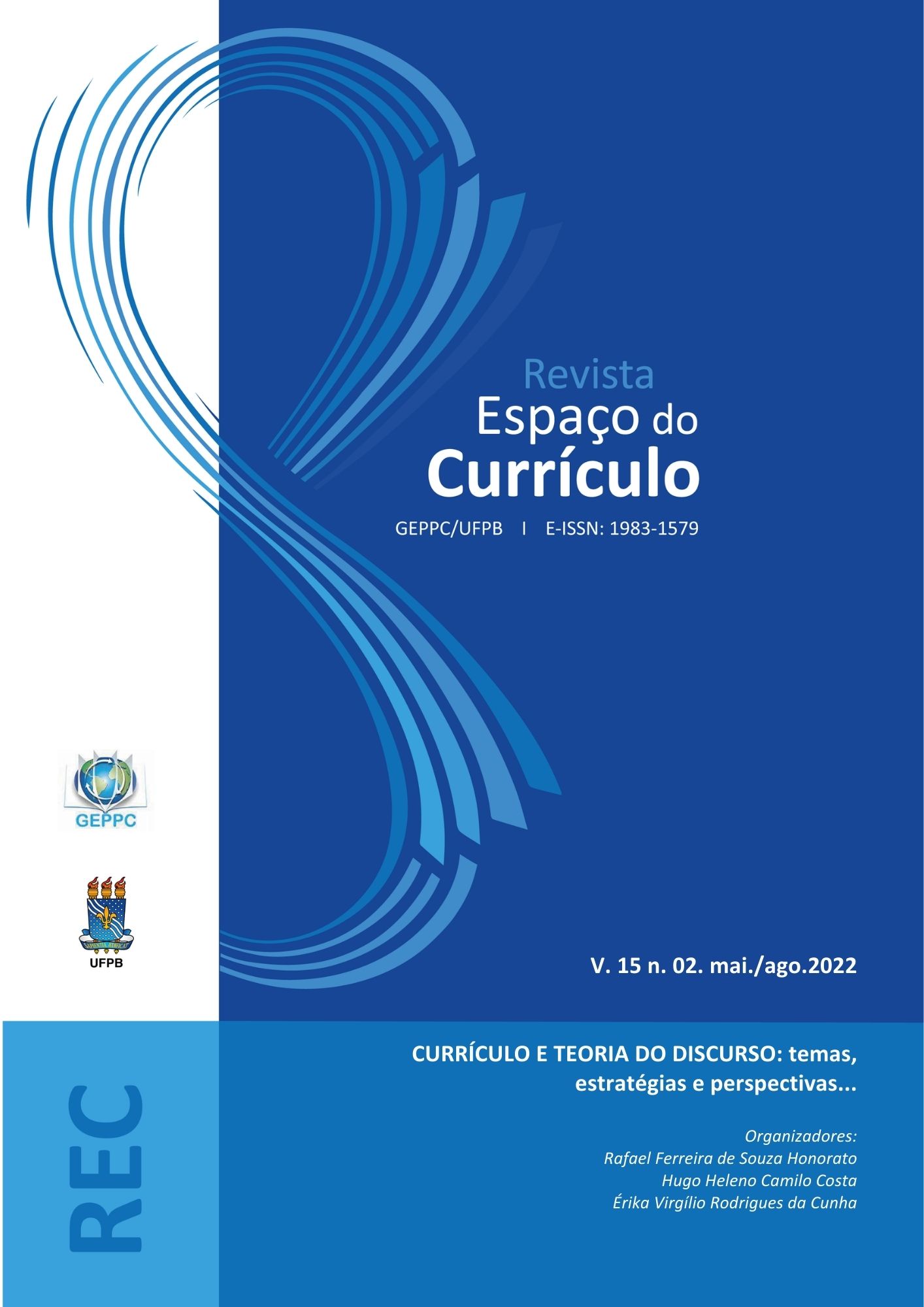THE SCHOOL CURRICULUM AND THE EMERGENCY OF A CRITICAL INTERCULTURAL EDUCATION
DOI:
https://doi.org/10.15687/rec.v15i2.62349Keywords:
Curricular Theories, Intercultural Education, CurriculumAbstract
This text intends to problematize the school curriculum over the years and the emergence of a critical intercultural education. For this, traditional, critical and post-critical theories of curriculum were approached, highlighting in them the central elements and the place of culture in each of them, as well as the intentions regarding the subjects and their insertion in society. Traditional theories emphasize social control and privilege dominant knowledge and culture. On the other hand, critical and post-critical theories are concerned with the power relations imbricated in the curriculum, thus, defending its construction based on reality, on the specificities and cultures of the students. By understanding the curriculum as a cultural artifact that influences the formation and performance of subjects in society, it is inferred that it is necessary to question the “abyssal” thinking imbricated in it. In favor of the recognition of cultural diversity, the breaking of practices of domination and exclusion and a critical formation, the production of curricula based on critical intercultural education, which is guided by the multiplicity of knowledge and cultures, is defended. aimed at combating all forms of inequality and discrimination present in Society.
Downloads
Metrics
References
CANDAU, Vera Maria. Cotidiano escolar e práticas interculturais. Cadernos de Pesquisa. V. 46, n. 16. p. 802-820. Jul/set. 2016a. Disponível em: https://www.scielo.br/j/cp/a/GKr96xZ95tpC6shxGzhRDrG/?lang=pt&format=pdf Acesso em: 12 de maio de 2021.
CANDAU, Vera Maria. Didática: tecendo/reinventando saberes e práticas. 1ª edição, Rio de Janeiro: 7 Letras, 2018.
CANDAU, Vera Maria. Diferenças Culturais, Interculturalidade e Educação em Direitos Humanos. Educ. Soc., Campinas, v. 33, n. 118, p. 235-250, jan-mar. 2012. Disponível em: https://www.scielo.br/j/es/a/QL9nWPmwbhP8B4QdN8yt5xg/?lang=pt&format=pdf Acesso em: 14 de abr. de 2021.
CANDAU, Vera Maria. Multiculturalismo e educação: desafios para a prática pedagógica. In: MOREIRA, Antônio Flávio; CANDAU, Vera Maria (Orgs.) Multiculturalismo: diferenças culturais e práticas pedagógicas. 2º edição, Petrópolis, RJ: Vozes, 2008, p.13-37.
CANDAU, Vera Maria. Direitos humanos, educação e interculturalidade: as tensões entre igualdade e diferença. Revista Brasileira de Educação, v. 13 n. 37 jan./abr. 2008. Disponível em: https://www.scielo.br/j/rbedu/a/5szsvwMvGSVPkGnWc67BjtC/?format=pdf&lang=pt Acesso em: 05 de maio de 2021.
CANDAU, Vera Maria. "Ideias-Força" do Pensamento de Boaventura Sousa Santos e a Educação Intercultural. Educ. rev. [online]. 2016, v.32, n.1, p.15-34. Disponível em: https://www.scielo.br/j/edur/a/cjS9NB4DWjqv8ncCZg7RbDM/?format=pdf&lang=pt Acesso em: 20 de set. de 2021.
HALL, Stuart. A centralidade da cultura: notas sobre as revoluções de nosso tempo. Educação & Realidade, v. 22, n. 2, p. 15-46, 1997. Disponível em: https://seer.ufrgs.br/educacaoerealidade/article/view/71361/40514 Acesso em: 20 de maio de 2021.
LOPES, Alice Casimiro. Teorias Pós-Críticas, Política e Currículo. Educação, Sociedade & Culturas, n. 39, 2013. Disponível em: https://www.fpce.up.pt/ciie/sites/default/files/02.AliceLopes.pdf. Acesso em: 15 de set. de 2021.
LOPES, Alice Casimiro; MACEDO, Elizabeth. O pensamento curricular no Brasil. In: LOPES, Alice Casimiro; MACEDO, Elizabeth. (org.) Currículo: debates contemporâneos. 3. Ed. – São Paulo: Cortez, 2010, p.13-54.
LOPES, Alice Casimiro; MACEDO, Elizabeth. Teorias do Currículo. São Paulo: Cortez, 2011.
MOREIRA, Antonio Flávio; CANDAU, Vera Maria. Currículo, conhecimento e cultura. In: MOREIRA, Antonio Flávio; CANDAU, Vera Maria. Indagações sobre o currículo. Brasília: Ministério da Educação, Secretaria da Educação Básica, 2008, p.17-46.
MOREIRA, Antonio Flavio; SILVA, Tomaz Tadeu da. Sociologia e Teoria Crítica do Currículo: uma introdução. In: MOREIRA, Antonio Flavio Barbosa; SILVA, Tomaz Tadeu. (Orgs.). Currículo, Cultura e Sociedade. 12. Ed. – São Paulo: Cortez, 2011, p.13-48.
NEIRA, Marcos Garcia; NUNES, Mário Luiz Ferrari. Educação Física, Currículo e Cultura. São Paulo: Phorte, 2009.
SANTOS, Boaventura Sousa. Por uma concepção multicultural de direitos humanos. Revista Crítica de Ciências Sociais, n. 48, junho, 1997. Disponível em: http://www.boaventuradesousasantos.pt/media/pdfs/Concepcao_multicultural_direitos_humanos_RCCS48.PDF. Acesso em: 09 de out. de 2021.
SANTOS, Boaventura Sousa. Tempo, códigos barrocos e canonização. Revista Crítica de Ciências Sociais, n. 51, 3-20, 1998. Disponível em: http://www.boaventuradesousasantos.pt/media/pdfs/Tempo_Codigos_Barrocos_RCCS51.PDF Acesso em: 04 de dez. de 2021.
SANTOS, Boaventura Sousa. Para uma sociologia das ausências e uma sociologia das emergências. Revista Crítica de Ciências Sociais, n.63, outubro, 2002. Disponível em: http://www.boaventuradesousasantos.pt/media/pdfs/Sociologia_das_ausencias_RCCS63.PDF. Acesso em: 06 de dez. de 2021.
SANTOS, Boaventura Sousa. Dilemas do nosso tempo: globalização, multiculturalismo e conhecimento. Educação e Realidade. Janeiro/junho, 2001. Disponível em: https://seer.ufrgs.br/educacaoerealidade/article/view/41311. Acesso em: 06 de dez. de 2021.
SANTOS, Boaventura Sousa. A gramática do tempo: Para uma nova cultura política. São Paulo: Cortez, 2006.
SANTOS, Boaventura Sousa. Para além do pensamento abissal: das linhas globais a uma ecologia de saberes. In: SANTOS, Boaventura Sousa; MENEZES, Maria Paula (orgs). Epistemologias do Sul. Almedina, 2009, p. 23-72.
SILVA, Tomaz Tadeu da. Documentos de identidade: uma introdução às teorias do currículo. 3ª ed. Belo Horizonte, Autêntica, 2011.
WOODWARD, Kathryn Identidade e Diferença: uma introdução teórica e conceitual. In: SILVA, Tomaz Tadeu da. (org.). Identidade e Diferença: a perspectiva dos estudos culturais. 13. Ed. – Petrópolis, RJ: Vozes, 2013, p.7-72.
REIS, Darianny Araújo dos. Currículo Intercultural Crítico na Escola: Formação que produz diferenças. Revista Teias, v. 18, n. 50, 2017. Disponível em: https://www.e-publicacoes.uerj.br/index.php/revistateias/article/view/29154/21614. Acesso em: 12 de jun. de 2021.
Downloads
Published
How to Cite
Issue
Section
License
Copyright (c) 2022 Curriculum Space Journal

This work is licensed under a Creative Commons Attribution 4.0 International License.
By submitting an article to Curriculum Space Journal (CSJ) and having it approved, the authors agree to assign, without remuneration, the following rights to Curriculum Space Journal: first publication rights and permission for CSJ to redistribute this article. article and its metadata to the indexing and reference services that its editors deem appropriate.
















